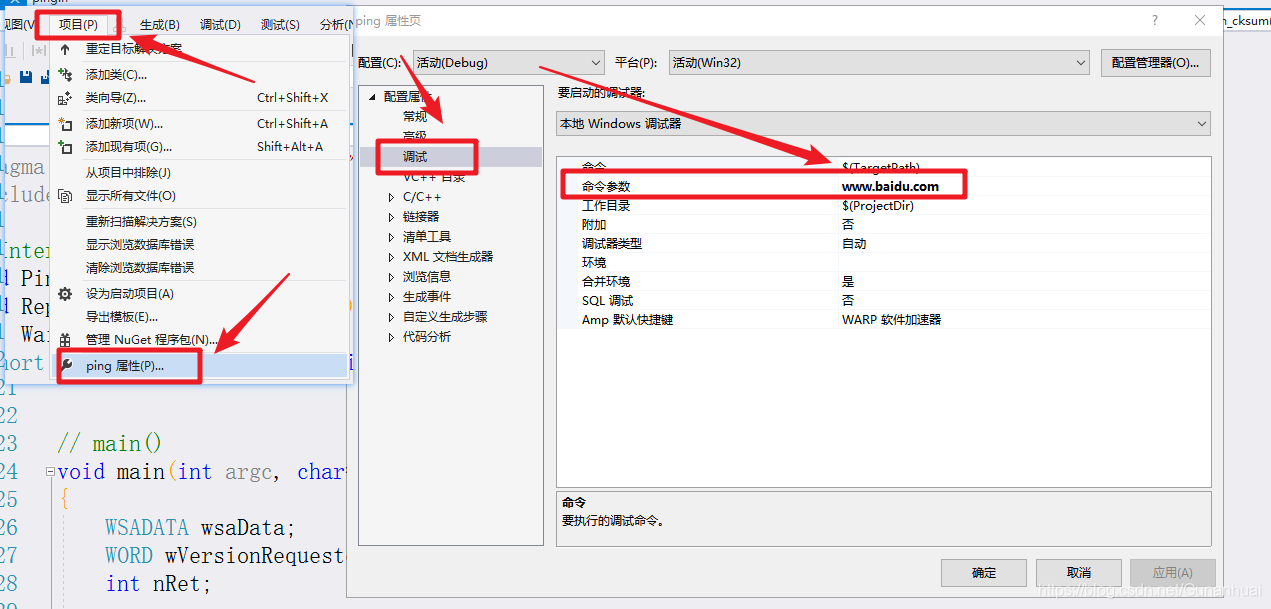【实验目的】
1.熟悉原始套接字编程的基本流程
2.理解ping程序的实现机制
3.理解ICMP协议的基于作用和报文格式。
4.完成原始套接字的配置。
【实验内容】
1.构造ICMP协议首部结构
2.构造ICMP回射请求结构。
3.构造ICMP回射应答结构。
4.构造IP首部结构。
5.创建原始套接字。
6.根据用户指定的地址获取目标IP。
7.对目标地址循环发送ICMP请求。
8.等待对方响应,并计算时间间隔。
源代码:
ping.h
#pragma pack(1)
#define ICMP_ECHOREPLY 0
#define ICMP_ECHOREQ 8
// IP Header -- RFC 791
typedef struct tagIPHDR
{
u_char VIHL; // Version and IHL
u_char TOS; // Type Of Service
short TotLen; // Total Length
short ID; // Identification
short FlagOff; // Flags and Fragment Offset
u_char TTL; // Time To Live
u_char Protocol; // Protocol
u_short Checksum; // Checksum
struct in_addr iaSrc; // Internet Address - Source
struct in_addr iaDst; // Internet Address - Destination
}IPHDR, * PIPHDR;
// ICMP Header - RFC 792
typedef struct tagICMPHDR
{
u_char Type; // Type
u_char Code; // Code
u_short Checksum; // Checksum
u_short ID; // Identification
u_short Seq; // Sequence
char Data; // Data
}ICMPHDR, * PICMPHDR;
#define REQ_DATASIZE 32 // Echo Request Data size
// ICMP Echo Request
typedef struct tagECHOREQUEST
{
ICMPHDR icmpHdr;
DWORD dwTime;
char cData[REQ_DATASIZE];
}ECHOREQUEST, * PECHOREQUEST;
// ICMP Echo Reply
typedef struct tagECHOREPLY
{
IPHDR ipHdr;
ECHOREQUEST echoRequest;
char cFiller[256];
}ECHOREPLY, * PECHOREPLY;
#pragma pack()
ping.c
//
// PING.C -- Ping program using ICMP and RAW Sockets
//
#define _WINSOCK_DEPRECATED_NO_WARNINGS
#include <stdio.h>
#include <stdlib.h>
//#include <winsock.h>
#include <WinSock2.h>
#pragma comment (lib,"Ws2_32.lib")
#include "ping.h"
// Internal Functions
void Ping(LPCSTR pstrHost);
void ReportError(LPCSTR pstrFrom);
int WaitForEchoReply(SOCKET s);
u_short in_cksum(u_short* addr, int len);
// ICMP Echo Request/Reply functions
int SendEchoRequest(SOCKET, LPSOCKADDR_IN);
DWORD RecvEchoReply(SOCKET, LPSOCKADDR_IN, u_char*);
// main()
void main(int argc, char** argv)
{
WSADATA wsaData;
WORD wVersionRequested = MAKEWORD(1, 1);
int nRet;
// Check arguments
if (argc != 2)
{
fprintf(stderr, "\nUsage: ping hostname\n");
return;
}
// Init WinSock
nRet = WSAStartup(wVersionRequested, &wsaData);
if (nRet)
{
fprintf(stderr, "\nError initializing WinSock\n");
return;
}
// Check version
if (wsaData.wVersion != wVersionRequested)
{
fprintf(stderr, "\nWinSock version not supported\n");
return;
}
// Go do the ping
Ping(argv[1]);
// Free WinSock
WSACleanup();
}
// Ping()
// Calls SendEchoRequest() and
// RecvEchoReply() and prints results
void Ping(LPCSTR pstrHost)
{
SOCKET rawSocket;
LPHOSTENT lpHost;
struct sockaddr_in saDest;
struct sockaddr_in saSrc;
DWORD dwTimeSent;
DWORD dwElapsed;
u_char cTTL;
int nLoop;
int nRet;
// Create a Raw socket
rawSocket = socket(AF_INET, SOCK_RAW, IPPROTO_ICMP);
if (rawSocket == SOCKET_ERROR)
{
ReportError("socket()");
return;
}
// Lookup host
lpHost = gethostbyname(pstrHost);
if (lpHost == NULL)
{
fprintf(stderr, "\nHost not found: %s\n", pstrHost);
return;
}
// Setup destination socket address
saDest.sin_addr.s_addr = *((u_long FAR*) (lpHost->h_addr));
saDest.sin_family = AF_INET;
saDest.sin_port = 0;
// Tell the user what we're doing
printf("\nPinging %s [%s] with %d bytes of data:\n",
pstrHost,
inet_ntoa(saDest.sin_addr),
REQ_DATASIZE);
// Ping multiple times
for (nLoop = 0; nLoop < 4; nLoop++)
{
// Send ICMP echo request
SendEchoRequest(rawSocket, &saDest);
// Use select() to wait for data to be received
nRet = WaitForEchoReply(rawSocket);
if (nRet == SOCKET_ERROR)
{
ReportError("select()");
break;
}
if (!nRet)
{
printf("\nTimeOut");
break;
}
// Receive reply
dwTimeSent = RecvEchoReply(rawSocket, &saSrc, &cTTL);
// Calculate elapsed time
dwElapsed = GetTickCount() - dwTimeSent;
printf("\nReply from: %s: bytes=%d time=%ldms TTL=%d",
inet_ntoa(saSrc.sin_addr),
REQ_DATASIZE,
dwElapsed,
cTTL);
}
printf("\n");
nRet = closesocket(rawSocket);
if (nRet == SOCKET_ERROR)
ReportError("closesocket()");
}
// SendEchoRequest()
// Fill in echo request header
// and send to destination
int SendEchoRequest(SOCKET s, LPSOCKADDR_IN lpstToAddr)
{
static ECHOREQUEST echoReq;
static nId = 1;
static nSeq = 1;
int nRet;
// Fill in echo request
echoReq.icmpHdr.Type = ICMP_ECHOREQ;
echoReq.icmpHdr.Code = 0;
echoReq.icmpHdr.Checksum = 0;
echoReq.icmpHdr.ID = nId++;
echoReq.icmpHdr.Seq = nSeq++;
// Fill in some data to send
for (nRet = 0; nRet < REQ_DATASIZE; nRet++)
echoReq.cData[nRet] = ' ' + nRet;
// Save tick count when sent
echoReq.dwTime = GetTickCount();
// Put data in packet and compute checksum
echoReq.icmpHdr.Checksum = in_cksum((u_short*)& echoReq, sizeof(ECHOREQUEST));
// Send the echo request
nRet = sendto(s, /* socket */
(LPSTR)& echoReq, /* buffer */
sizeof(ECHOREQUEST),
0, /* flags */
(LPSOCKADDR)lpstToAddr, /* destination */
sizeof(SOCKADDR_IN)); /* address length */
if (nRet == SOCKET_ERROR)
ReportError("sendto()");
return (nRet);
}
// RecvEchoReply()
// Receive incoming data
// and parse out fields
DWORD RecvEchoReply(SOCKET s, LPSOCKADDR_IN lpsaFrom, u_char* pTTL)
{
ECHOREPLY echoReply;
int nRet;
int nAddrLen = sizeof(struct sockaddr_in);
// Receive the echo reply
nRet = recvfrom(s, // socket
(LPSTR)& echoReply, // buffer
sizeof(ECHOREPLY), // size of buffer
0, // flags
(LPSOCKADDR)lpsaFrom, // From address
&nAddrLen); // pointer to address len
// Check return value
if (nRet == SOCKET_ERROR)
ReportError("recvfrom()");
// return time sent and IP TTL
*pTTL = echoReply.ipHdr.TTL;
return(echoReply.echoRequest.dwTime);
}
// What happened?
void ReportError(LPCSTR pWhere)
{
fprintf(stderr, "\n%s error: %d\n",
WSAGetLastError());
}
// WaitForEchoReply()
// Use select() to determine when
// data is waiting to be read
int WaitForEchoReply(SOCKET s)
{
struct timeval Timeout;
fd_set readfds;
readfds.fd_count = 1;
readfds.fd_array[0] = s;
Timeout.tv_sec = 5;
Timeout.tv_usec = 0;
return(select(1, &readfds, NULL, NULL, &Timeout));
}
//
// Mike Muuss' in_cksum() function
// and his comments from the original
// ping program
//
// * Author -
// * Mike Muuss
// * U. S. Army Ballistic Research Laboratory
// * December, 1983
/*
* I N _ C K S U M
*
* Checksum routine for Internet Protocol family headers (C Version)
*
*/
u_short in_cksum(u_short* addr, int len)
{
register int nleft = len;
register u_short* w = addr;
register u_short answer;
register int sum = 0;
/*
* Our algorithm is simple, using a 32 bit accumulator (sum),
* we add sequential 16 bit words to it, and at the end, fold
* back all the carry bits from the top 16 bits into the lower
* 16 bits.
*/
while (nleft > 1) {
sum += *w++;
nleft -= 2;
}
/* mop up an odd byte, if necessary */
if (nleft == 1) {
u_short u = 0;
*(u_char*)(&u) = *(u_char*)w;
sum += u;
}
/*
* add back carry outs from top 16 bits to low 16 bits
*/
sum = (sum >> 16) + (sum & 0xffff); /* add hi 16 to low 16 */
sum += (sum >> 16); /* add carry */
answer = ~sum; /* truncate to 16 bits */
return (answer);
}
更改ping调试信息

运行效果:

icmp抓包效果截图:
